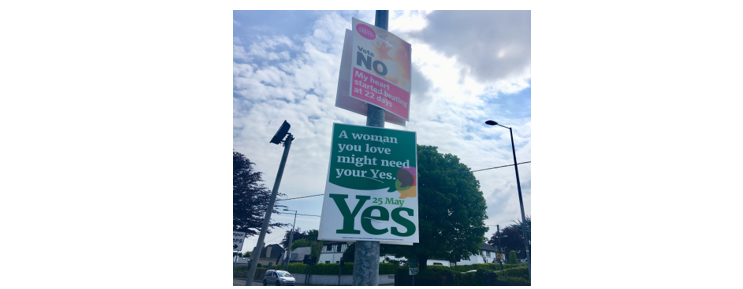In This Section

The Challenge
Misinformation and ‘fake news’ are pressing concerns across society, for a whole range of issues, including politics. There have been many attempts to reduce how often internet users encounter fake political news and/or to reduce belief once exposed. Research has shown that this is very difficult. For example, Facebook added labels that read “disputed by third party fact checkers” to news stories, but removed them shortly after, as evidence showed they were not just ineffective, but sometimes increased belief in fake news items. Clearly there is an urgent need to understand the impact of fake news stories.
We need to better understand the ways in which different people are vulnerable to different types of fake news. We know voters can believe a fake news story is true, but this project went one step further to study the effects of fake news on voters’ memories for completely fabricated events, assessing who was most vulnerable and why.
Ireland, as a country with a strong democracy and well-regulated media, provides an interesting context in which to assess the impact of misinformation on voters’ memories.
The Research
This research was partially funded by a Charlemont Grant Award from the Royal Irish Academy and Seed Funding from the School of Applied Psychology that supported collaboration with researchers in University of California, Irvine and University College Dublin. We partnered with TheJournal.ie and invited all Irish citizens over 18 to complete an online study in May 2018. This was important because we wanted to hear from people across Ireland, not just university staff and students.
We recruited over 3000 participants, equivalent to one in every 1000 registered voters in the Republic of Ireland. Participants were presented with short news stories of campaign events, accompanied by a photograph, and were asked to tell us how well they remembered the event, where they had heard it and how they had felt. Some of these events were true, but some were fabricated. For example, all participants saw either a story that implicated the ‘Yes’ side OR the ‘No’ side in having to destroy illegally-funded campaign posters.
We found that almost half (48%) of participants reported a false memory. In addition, people were especially likely to form a false memory for fake news that was in line with their beliefs (i.e. ‘Yes’ voters were more likely to ‘remember’ a ‘No’ campaign scandal and vice-versa). We also found that warning people that they may have seen fake news did very little to reduce the rates of false memories and did not eliminate this effect of bias, with participants less likely to detect fake news that was in line with their beliefs.
The Impact
This was one of the largest false memory studies conducted to date, globally, and is especially novel as it was conducted during a real-world referendum. It sheds light on how Irish citizens can be misled by fabricated news stories, potentially affecting their voting behavior.
This project had Knowledge Production Impact, resulting in a peer-reviewed paper in a top international journal. All materials and data associated with the project are available on the Open Science Framework, for other researchers to access. The project was also presented at international conferences (supported by a CACSSS Research Support Fund award).
This project has had Social and Cultural Impact as the findings were leveraged to stimulate public debate on the issue. National media coverage included articles on TheJournal.ie and interviews on RTE’s 10 Things to Know programme and The Pat Kenny Show on Newstalk radio. International media coverage included Forbes, Rolling Stone, BBC, Fox News and others1. Local engagement was also prioritised, with a public talk at a joint European Researcher’s Night/Cork Skeptics event in Blackrock Castle Observatory.
This research also contributed to Capacity-Building Impact by increasing public-science dialogue. A member of the public posted the study Reddit for discussion. It quickly gained hundreds of thousands of views, ending up on ‘the front page’ of Reddit, as over 50,000 members had ‘upvoted’ the post. Over 2000 comments were posted and the research team answered questions about the study, directly engaging with the public. Additional Capacity
Building Impact in the area of teaching and learning included student internships, where 10 students gained experience and UCC Works Awards while contributing to this project and other spin-off research, including a year-long study where we followed up with our participants to see how their memories may have changed in the months following the referendum. More outcomes and impact are expected from this research.
This project is the first in a series of studies that will help us to better understand voter memories across different contexts, in Ireland and around the world. It is anticipated that this project will eventually generate Policy Impact, as governments seek to understand how best to regulate political media and keep voters informed.
For More Information
This project was led by Dr Gillian Murphy, School of Applied Psychology, UCC.
The published research paper is available from the UCC Library. The Reddit discussion page can be viewed here. Samples of media coverage can be found here, here and here.
“Thanks for designing this study. In the first survey I had false memories of stories that had not happened, because they 'seemed like something that could have happened'. This sense was definitely coloured by my strong pro-choice sympathies, so it helped me to realise how people fall into the trap of believing things that are not actually true, and I have become more aware of my own susceptibility as a result.
Anonymous Participant
1While exact readership figures are difficult to estimate Altmetric has placed the outputs related to this study in the top 5% of all 14.2 million outputs tracked by their system.
College of Arts, Celtic Studies & Social Sciences
Coláiste na nEalaíon, an Léinn Cheiltigh agus na nEolaíochtaí Sóisialta
Contact us
College Office, Room G31 ,Ground Floor, Block B, O'Rahilly Building, UCC
